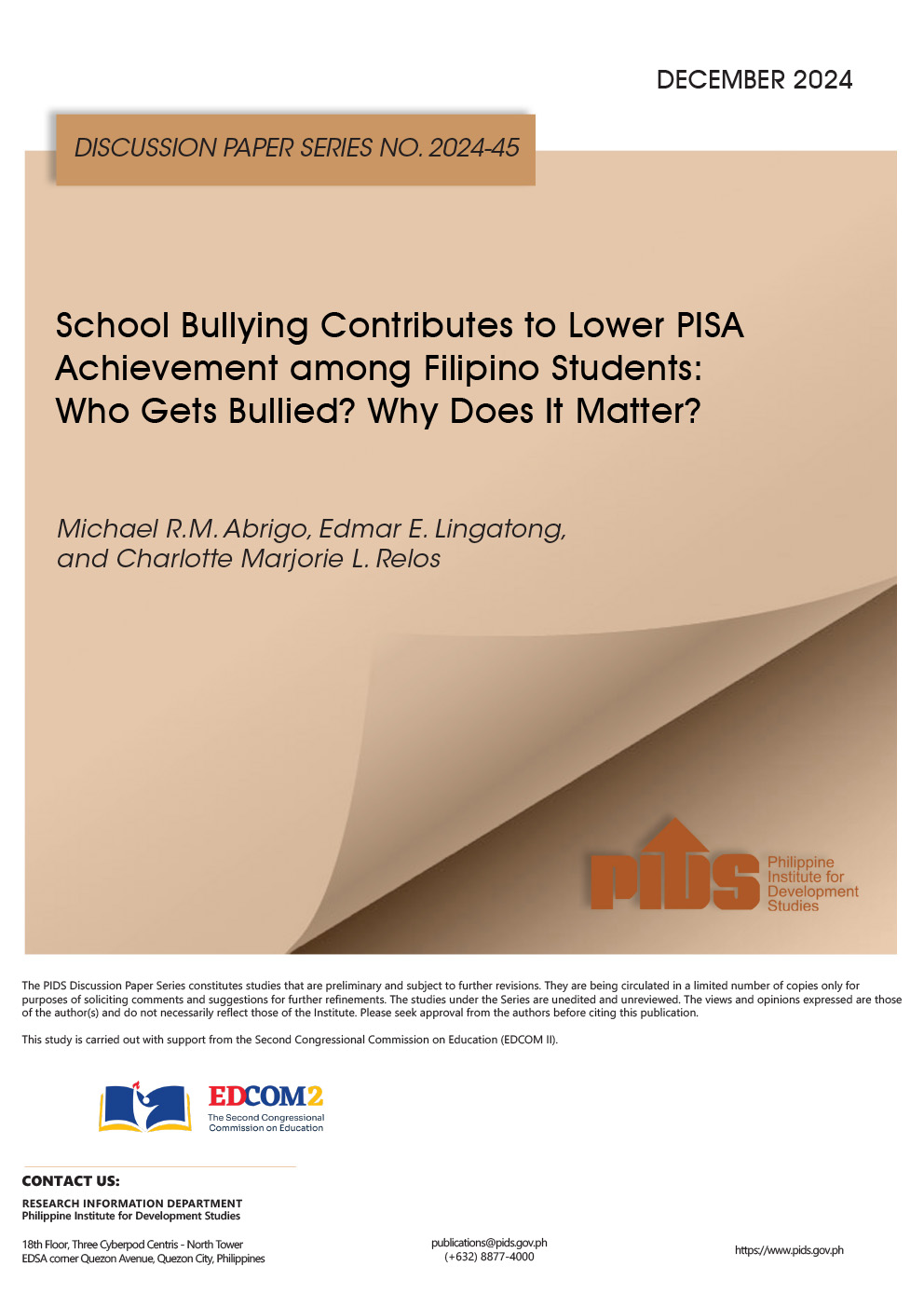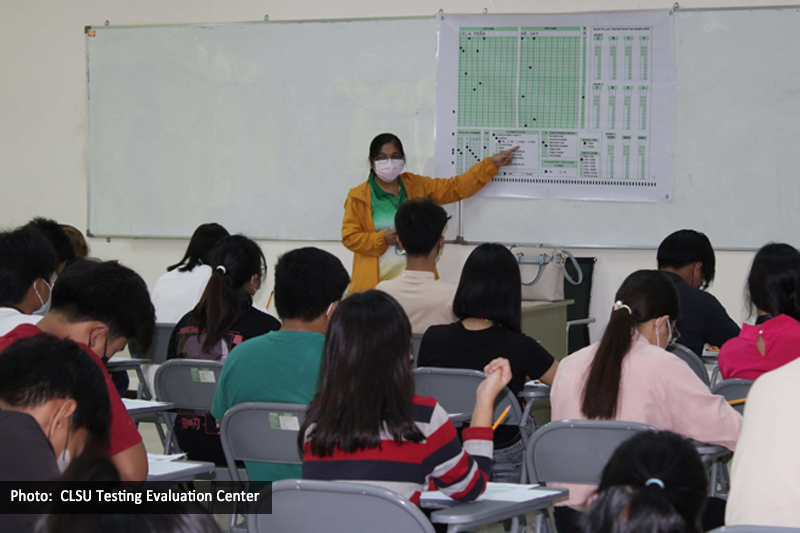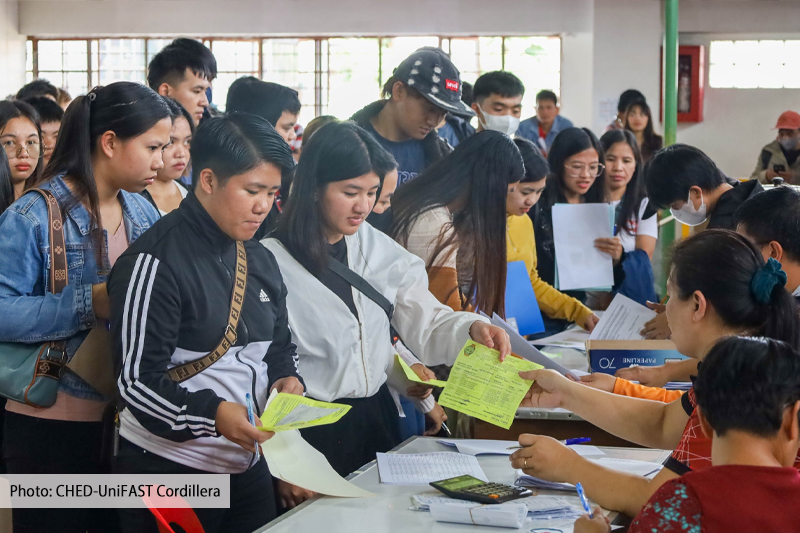University of the Philippines Diliman Chancellor Michael Tan and other like-minded administrators of state universities and colleges may be up to something. In a statement released July 12, Chancellor Tan said the UP Diliman administration has reached a “decision to suspend collection of any kind of fee during the ongoing pre-registration for the 1st semester, 2017-2018.” Aspiring and current UP Diliman students have warmly welcomed reports about the flagship UP campus going tuition-free. No surprise about that because UP tuition fees are currently pegged at P1,500 per unit — the Foes of free tuition meanwhile are oddly celebrating that it is only a temporary suspension. They can’t wait to continue the high tuition policy that promotes the privilege of those with the “ability to pay” at the expense of everyone else.
The publicly funded think-tank Philippine Institute for Development Studies has also openly attacked free tuition as allegedly anti-poor in an infographic (and study) that conveniently omitted certain prejudicial facts. The PIDS “study” was an obvious apologia for and homage to “austerity” by leaving out important details such as: 1) the rising tuition and other fees in both private and state colleges and universities; 2) the minuscule amount of state subsidies for students in the tertiary level, compared with those in elementary and high school; 3) the corporatization of SUCs to facilitate commercialization and privatization; 4) the existence of free tuition models in a number of city and municipal colleges and universities; and 5) the socio-economic situation of poor and middle-class families who wish to send their kids to college.
I say we must welcome Chancellor Tan’s decision to suspend the collection of all fees, albeit only temporarily.
This is where it gets interesting: In his July 12 statement, Chancellor Tan explained: “Under [the Commission on Higher Education’s] scheme, undergraduate students will be prioritized by need and extended subsidies from a fund which for UP is P183 million for the semester. This fund will not be sufficient to cover all students, and is limited to tuition fees alone, meaning even the poorest students will still have to pay miscellaneous fees.
Chancellor Tan pointed out that “UP Diliman is following CHED guidelines and is at the stage of calling students to apply for this subsidy, which requires documentation, mainly income tax returns. The number of applications will allow us to better assess the needs for subsidies, and to look for additional sources of support, if needed.
Buried in the statement are two important colatilla that I think Chancellor Tan poses to UP and SUC students nationwide:
One: “In addition to the CHED scheme, we now have a bill on universal access to tertiary education that has passed a bicameral committee.
Two: “[W]e have only suspended collection of payments for undergraduates. We support the calls for the passage of the universal access to tertiary education bill and the provision of adequate funds to implement whatever subsidies there will be. We will continue to adjust our registration procedures as needed.
Is Chancellor Tan and other SUC administrators discreetly backing the students’ and public’s demand for free tuition by making it a “fait accompli” via a temporary suspension of tuition collection?
He didn’t express support for the CHED guidelines. He only said UP Diliman would only comply with it.
What he says UP Diliman supports is “the passage of the universal access to tertiary education bill” — and could there be anything better than that?
Chancellor Tan’s decision to suspend tuition collection, and his support for universal access — no tuition and miscellaneous fees — could be nothing less than an invitation to students and the public to fight on, to rally on, to struggle on, to push the campaign forward.
His statement could be taken this way: “We give you a taste of free tuition. Now, let’s go and fight to make it permanent.”
I say that it would be a most beautiful problem for government if millions would in the future knock on UP’s and SUCs’ doors, to lay a claim to their right to education. What country has been mired in poverty or bankruptcy by young people seeking college degrees?
The student movement’s campaign for a free, nationalist, scientific, and mass-oriented educational system has come a long way — especially in the “free” part. Free tuition is now generally accepted as good, life-changing, positive, progressive, possible, and doable. It has reached Malacanang, Congress, CHED, and the boards of regents and trusties of all SUCs.
We have come so close. Free education for all requires more effort to make it real not just this semester and not just for undergraduates. It is something waiting to be completely won in a battle with privileged spoilers, deceptive think-tanks, and the rotten tuition system they hope to maintain.
Follow me on Twitter @tonyocruz
The publicly funded think-tank Philippine Institute for Development Studies has also openly attacked free tuition as allegedly anti-poor in an infographic (and study) that conveniently omitted certain prejudicial facts. The PIDS “study” was an obvious apologia for and homage to “austerity” by leaving out important details such as: 1) the rising tuition and other fees in both private and state colleges and universities; 2) the minuscule amount of state subsidies for students in the tertiary level, compared with those in elementary and high school; 3) the corporatization of SUCs to facilitate commercialization and privatization; 4) the existence of free tuition models in a number of city and municipal colleges and universities; and 5) the socio-economic situation of poor and middle-class families who wish to send their kids to college.
I say we must welcome Chancellor Tan’s decision to suspend the collection of all fees, albeit only temporarily.
This is where it gets interesting: In his July 12 statement, Chancellor Tan explained: “Under [the Commission on Higher Education’s] scheme, undergraduate students will be prioritized by need and extended subsidies from a fund which for UP is P183 million for the semester. This fund will not be sufficient to cover all students, and is limited to tuition fees alone, meaning even the poorest students will still have to pay miscellaneous fees.
Chancellor Tan pointed out that “UP Diliman is following CHED guidelines and is at the stage of calling students to apply for this subsidy, which requires documentation, mainly income tax returns. The number of applications will allow us to better assess the needs for subsidies, and to look for additional sources of support, if needed.
Buried in the statement are two important colatilla that I think Chancellor Tan poses to UP and SUC students nationwide:
One: “In addition to the CHED scheme, we now have a bill on universal access to tertiary education that has passed a bicameral committee.
Two: “[W]e have only suspended collection of payments for undergraduates. We support the calls for the passage of the universal access to tertiary education bill and the provision of adequate funds to implement whatever subsidies there will be. We will continue to adjust our registration procedures as needed.
Is Chancellor Tan and other SUC administrators discreetly backing the students’ and public’s demand for free tuition by making it a “fait accompli” via a temporary suspension of tuition collection?
He didn’t express support for the CHED guidelines. He only said UP Diliman would only comply with it.
What he says UP Diliman supports is “the passage of the universal access to tertiary education bill” — and could there be anything better than that?
Chancellor Tan’s decision to suspend tuition collection, and his support for universal access — no tuition and miscellaneous fees — could be nothing less than an invitation to students and the public to fight on, to rally on, to struggle on, to push the campaign forward.
His statement could be taken this way: “We give you a taste of free tuition. Now, let’s go and fight to make it permanent.”
I say that it would be a most beautiful problem for government if millions would in the future knock on UP’s and SUCs’ doors, to lay a claim to their right to education. What country has been mired in poverty or bankruptcy by young people seeking college degrees?
The student movement’s campaign for a free, nationalist, scientific, and mass-oriented educational system has come a long way — especially in the “free” part. Free tuition is now generally accepted as good, life-changing, positive, progressive, possible, and doable. It has reached Malacanang, Congress, CHED, and the boards of regents and trusties of all SUCs.
We have come so close. Free education for all requires more effort to make it real not just this semester and not just for undergraduates. It is something waiting to be completely won in a battle with privileged spoilers, deceptive think-tanks, and the rotten tuition system they hope to maintain.
Follow me on Twitter @tonyocruz












